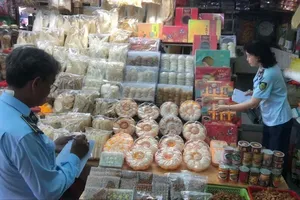HA NOI (VNS) — Viet Nam's central bank devalued the dong by 1 per cent again yesterday, its third currency depreciation this year.
The State Bank of Viet Nam (SBV) reduced the reference rate, or the inter-bank exchange rate, from VND21,673 to VND21,890 per US dollar, while expanding the trading band for this rate from plus or minus 2 per cent to 3 per cent.
With the new band, the dollar is now being traded between VND21,233 and VND22,547.
The adjustments came just a week after the central bank widened the band from 1 per cent to 2 per cent to counter China's yuan devaluations that totaled 4.6 per cent last week alone – the sharpest Chinese currency depreciation in the last two decades.
"After the strong depreciation of the yuan, the domestic market sentiment is still largely concerned about the impact of the imminent US Federal Reserve's interest rate increase," the central bank said in an online statement.
It noted that its changes were aimed to proactively lead the market and pre-empt any negative impact of a possible Fed Reserve's rate hike.
Domestic commercial banks immediately raised their exchange rates yesterday morning, lifting the rates by at least VND275 from the previous day's levels.
Of note, Eximbank, BIDV and Asia Commercial Bank posted the highest selling rate of VND22,480 per dollar.
Vietinbank quoted the ceiling rate at VND22,450 per dollar, while Vietcombank was selling the dollar for VND22,400. Sacombank quoted the lowest rate at VND22,360 per dollar at 8.47am.
HSBC Vietnam CEO Pham Hong Hai said the SBV's adjustments were necessary to help stabilise the market by creating a currency trading band large enough for supply and demand to meet. This was a step ahead of possible further market fluctuations.
"The policy action today is positive in its promptness in response to China's devaluation," economist Eugenia Fabon Victorino from ANZ Bank in Singapore said, in a quick response yesterday.
"The timing was not a surprise to us, but it did come through as more aggressive than what we had expected," she said. "At this point, we think that the moves will provide room for the dong to weaken further without putting pressure on the central bank to intervene.
"Further policy action cannot be ruled out entirely, especially in the event of further sharp weakness of the yuan. Today's move suggests to us that the SBV is proactive and will act if such a need arises."
Victorino noted that, from an economic perspective, the dong had been among the more resilient currency amidst the EM (emerging markets) Asia currency downdraft of recent months.
"Viet Nam is not actively participating in a currency war or a race-to-the-bottom, as some headlines may suggest," she said.
Meanwhile, strategist Eddie Cheung at Standard Chartered said in an alert note yesterday that the short period of time between the policy announcements and the combination of a devaluation and a band widening took them by surprise and suggested a sense of urgency behind the central bank's latest action.
"Apart from foreign exchange volatility following the Chinese yuan devaluation last week, there appears to have been no significant change in macro developments driving the latest policy action," Cheung said, adding that the combined adjustments might reflect Vietnamese authorities' concern about yuan moves.
According to VnExpress online, Viet Nam witnessed a trade deficit of $19 billion with China during the first seven months of this year, about $4.5 billion higher than the figure recorded in the same period last year. In 2014, the total trade deficit with China was $29 billion.
National Financial Supervisory Commission Vice Chairman Truong Van Phuoc told the news website last week that Viet Nam would likely face increasing pressure in foreign trade if China continued to devalue the yuan. Then, Viet Nam should be more flexible in operating its exchange rates.
"Viet Nam's [previous] commitments in keeping exchange rates stable were based on a context of low inflation and interest rates, alongside an export rally and higher economic growth. But we, and the whole world had not expected China to depreciate the yuan like this," he said.
Prime Minister Nguyen Tan Dung has also suggested authorities implement a more flexible monetary policy, in tight conjunction with fiscal policies, to ensure macro-economic stability. — VNS
























